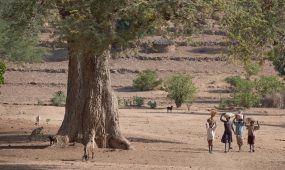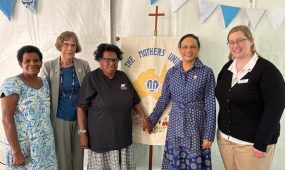South Sudanese Churches shelter populations displaced by floods
News
Churches and schools in South Sudan are providing shelter to displaced populations – after floods caused by early seasonal rainfall – submerged their homes and farmland

Churches and schools in South Sudan are providing shelter to displaced populations—after floods caused by early seasonal rainfall—submerged their homes and farmland.
At least 426,000 people—including 185,000 children—are affected by the flooding, according to the United Nations. The numbers are expected to rise, as more rain pounds regions of the world’s newest nation. The nation is still struggling to find peace after several years of conflict.
“The areas most affected by floods are Jonglei, Upper Nile, and Unity State. The floods have also affected the poor infrastructure, agricultural land, shelters, and homes of communities. Also affected are the internally displaced persons who have been forced out of their villages by violence,” said Fr James Oyet Latansio, a Roman Catholic Priest and general secretary of the South Sudan Council of Churches.
Advertisement
In South Sudan, peace is still fragile, according to church officials. The churches are responding to humanitarian needs such as food emergency and health services, as they also work to tame inter-communal violence, sexual and gender violence, insecurity on the roads, and killings. Recently, emergence of COVID-19 added to the challenges, with the measures made to tame the pandemic complicating humanitarian responses.
Adding to the challenge is the latest flood disaster, which has been triggered by the overflowing of the Nile, Lol and Sobat rivers, and the Sudd Wetlands.
The floodwaters have been breaking past the river banks and dykes to engulf large stretches of land where the communities graze their animals. The floods have also submerged villages, leaving thousands of people without homes.
“Floods have exacerbated the vulnerability of communities, with many displaced…seeking refuge in churches and schools. Health facilities have been impacted,” said the United Nations Office for the coordination of Humanitarian Affairs.
Forced out by the floods, the communities are moving to higher grounds where they hope to get some assistance. More rainfall and flooding is expected to occur in the coming months, meaning that more people will need food aid, as the disaster makes farms and fields inaccessible.
Advertisement
“The humanitarian response is just limited due to the poor infrastructure and the roads. Not to mention the security of humanitarian workers which remains a challenge,” said Latansio.
According to the Ecumenical Network on South Sudan, at least 128 aid workers—the majority of them from South Sudan—have been killed in the country since 2013.
On 21 September—International Day of Peace—the network said in a statement that South Sudan was experiencing flooding among other disasters and urged the government to “inclusively and equitably share resources and protect and nurture God’s creation for the next generation to come.”
According to agencies, 8.3 million people in South Sudan are in need of humanitarian assistance due to conflict and other disasters. An estimated 2.3 million have been forced to flee the country, while 1.7 million are internally displaced. With one of the worst world’s food crisis, it ranks very highly as one of the countries most vulnerable to the COVID-19 pandemic.
First published on the World Council of Churches website on 23 September 2021.





